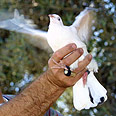
A new language of peace
You can’t force human beings of any age to do or say anything, writes Ray Hanania
For Alison, being Jewish, she wanted him to say “Shalom.”
For me, being Palestinian, I wanted to teach him something simple like “Palestine is Arab Land. Free Palestine. Long Live the Revolution. Down with the Shah. The people, united with never be defeated.”
But I ended up compromising with myself, as many Palestinians often do. And I settled on just trying to teach him to say the word “Salam.”
When Alison wasn’t watching, I would turn towards my son and repeat the word over and over again. “Salam! Salam! Salam!” Being only two, he just looked at me like I was some kind of nut.
I am sure Alison was doing the same thing when I wasn’t around. I often over heard her repeatedly whispering the word “Shalom,” and even the entire lyrics from HaTikvah slowly and steadily in the baby’s room.
Still, after all those concentrated by failed teaching lessons, our son never seemed to pick up either of our intended phrases.
The truth is you can’t force human beings of any age to do or say anything, unless they want to do or say something themselves. Kids, especially, never learn what you want them to learn, and neither do some adults. They learn what they want to learn, when they want to learn it.
So the first words our son spoke came on his schedule, unexpectedly, and surprising us both, of course.
Beware of what you say in front of children
I was driving my SUV Taxi Cab decorated with the 15 snap-on American flags (to discourage sneers from other Americans as I drove by) and bumper stickers that proclaimed, despite my ethnic appearance, that I was a "proud American." And I was stuck in traffic.
As hard as you try not to say bad words in front of your child, some words inevitably just slip past. Impatient with rush hour traffic, I started a stream of angry and frustrating epithets.
No, I’m not talking about the final words one says at the end of a person’s life, at the closing remarks of a religious service, or at leaving one's settlement in the Gaza Strip.
I mean bad words. Words you wouldn’t repeat in good company.
At the end of the stream of angry epithets, I ended it with one of my favorite. “Moron!”
And from the back of the car in the passenger seat, safely and snuggly wrapped in his seat belt and baby chair, I heard my son utter his first word. “Mooooorrrrrrron!”
Of course, that began the toughest conversation I have ever had with my wife, other than our first one: "You a Jew? I thought you said you were just Jew-ish?"
“Honey,” I began a little reluctantly. “Guess what?”
“Don’t tell me,” my wife said. “Aaron spoke his first words and I wasn’t even there. What was it?”
I could hear the excitement in her voice.
“Well, it’s good news and it’s bad news,” I began.
“You mean his first word wasn’t just a word? It was a phrase?” she asked perplexed.
“Aaaaaah. Not exactly a phrase,” I said. “The good news, honey, is Aaron did utter his first word.”
“And the bad news?” my wife demanded.
Well, as you can imagine, it took us both a lot of hard work to undo the damage and teach him another “first” word.
We both continued with our political messages of peace. “Shalom,” Alison said. “Salam,” I quickly contributed.
And then one day, on his own, Aaron looked up and surprised us both as we sat around the dinner table.
It was a very simple phrase. But he said it so clearly and with such a bright smile, it made us both sigh with relief and hope.
Aaron simply said “Shalam.”
- Ray Hanania writes exclusively for YnetNews.com on issues that are serious, satirical and humorous. He can be reached at http://www.hanania.com










